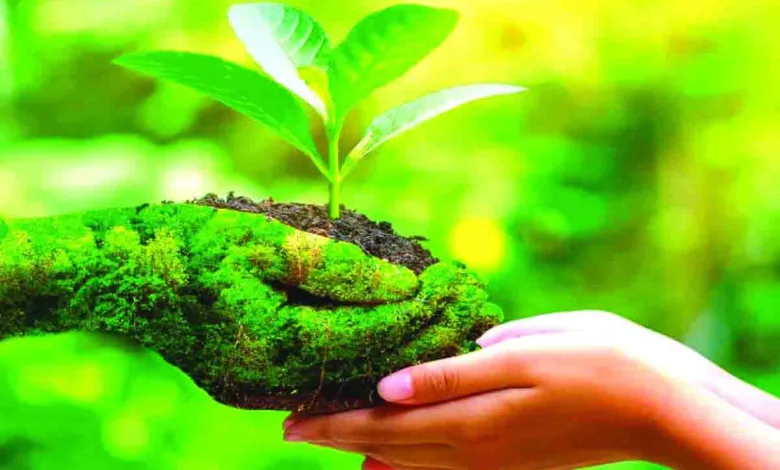India’s focus on lifestyle for environment on World Environment Day

Monday, 05 June 2023 | Govind Singh Rajwar | in Guest Column
GUEST COLUMN
 Govind Singh Rajwar
Govind Singh Rajwar
The theme for World Environment Day to be held today is solutions to plastic pollution.Various ecosystems of the world are being heavily inundated by plastic. More than 400 million tonnes of plastic is produced every year, half of which is classified as used only once of which less than 10 per cent is recycled. An estimated 19-23 million tonnes goes into lakes, rivers and seas. Nowadays, plastic plugs the landfills, leaches into the ocean and is combusted into toxic smoke, making it the biggest threat to the planet. Single-use plastic products have severe environmental, social, economic and health consequences. Around the world, one million plastic bottles are purchased every minute, while up to five trillion plastic bags are used every year. In total, half of all plastic produced is designed for single-use purposes and then thrown away. Plastics including microplastics are becoming part of the Earth’s fossil record and a marker of the Anthropocene, our current geological era. Plastic is a synthetic organic polymer made from petroleum with properties ideally suited for a range of applications including packaging, building and construction, household and sports equipment, vehicles, electronics and agriculture. Over 300 million tonnes of plastic are produced every year, half of which is used to create single-use items such as shopping bags, cups and straws. A new name has been assigned to this era as “plastisphere”. From the 1950s to the 1970s, only a small amount of plastic was produced, and as a result, plastic waste was relatively manageable. In the early 2000s, the amount of plastic waste we generated rose more in a single decade than it had in the past 40 years. If the historic growth of plastic use continues, global production of primary plastic is forecasted to reach 1,100 million tonnes by 2050.We have also seen a significant shift towards single-use plastic products, items that are meant to be thrown away after a single short use. Approximately 36 per cent of all plastics produced are used in packaging, including single-use plastic products for food and beverage containers, approximately 85 per cent of which ends up in landfills or as unregulated waste.
Additionally, some 98 per cent of single-use plastic products are produced from fossil fuel, or “virgin” feedstock. A forecast says that the level of greenhouse gas emissions associated with the production, use and disposal of conventional fossil fuel-based plastics would grow to 19 per cent of the global carbon budget by 2040. Rivers and lakes carry plastic waste from deep inland to the sea, making them major contributors to ocean pollution. Unless we change how we produce, use and dispose of plastic, the amount of plastic waste entering aquatic ecosystems could nearly triple from 9-14 million tonnes per year in 2016 to a projected 23-37 million tonnes per year by 2040. It is estimated that 1,000 rivers are accountable for nearly 80 per cent of global annual riverine plastic emissions into the ocean, which range between 0.8 and 2.7 million tonnes per year, with small urban rivers amongst the most polluting.
To think positively in this direction, we have solutions in science and human behaviour to tackle the problem –and a lot is already being followed and researched upon. The most important need of the day for our planet is to mount a public and political pressure to scale up and speed actions from governments, companies and other stakeholders to solve this worst crisis. This highlights the importance of this World Environment Day by mobilising action from every corner of the world. The World Environment Day 2023 will be hosted by Côte d’Ivoire in partnership with the Netherlands.Côte d’Ivoire is one of the leaders in the campaign against plastic pollution. It banned the use of plastic bags in 2014 and supports a shift to reusable packaging. The country’s largest city, Abidjan, has also become a hub for environmentally minded startups. Jean-Luc Assi, Côte d’Ivoire’s Minister for the Environment and Sustainable Development said, “The scourge of plastic pollution is a visible threat that impacts every community. We are proud to champion diverse treatments for the plastic pandemic.” The occasion will be co-hosted by the Government of The Netherlands, which is one of the countries taking sustainable action for plastic life cycle.Vivianne Heijnen, Netherlands’ Minister for the Environment said, “Plastic pollution and its detrimental impacts on health, the economy and the environment cannot be ignored. Urgent action is required. As part of several policies aimed at plastics, The Netherlands and the European community at large are fully committed to reduce the production and consumption of single-use plastic, which can and must be replaced with durable and sustainable alternatives.”
This year, India’s Ministry of Environment, Forest and Climate Change has announced that World Environment Day 2023will be celebrated with a focus on the Mission LiFE, which stands for Lifestyle for Environment. The aim is to encourage people to adopt sustainable lifestylepractices to protect the environment. The concept of LiFE was introduced by the Prime Minister Narenda Modi at the 2021 United Nations Climate Change Conference (COP26) in Glasgow. This year we will witness the lunar eclipse on World Environment Day. Astrologically, it is believed that an eclipse brings some kind of negative energies with it. Lunar eclipse has a different impact on different moon signs depending on which house is activated in the birth chart. In Atharva Veda, the Earth is considered as the mother, and human beings symbolise her sons. The Vedas have also explained the importance of trees and plants including their plantation on the lunar eclipse day. Trees provide us Prana Vayu and maintain the harmony between the earth and the sky. As per Vedic astrology, a person can get freedom from ailments, physical, social and economic problems by planting a tree. This is perhaps one of the reasons, our ancestors worshipped trees.
Planting a tree on World Environment Day will not only nurture mother earth but also save you from the negative impact of planets. There are many ways of celebrating the World Environment Day today like switching to sustainable products ideally made from natural and biodegradable materials in plastic-free or recyclable packaging, planning a clean-up activity in park or river, making a commitment to recycling, planting a tree in surrounding garden or society compound and volunteering tomake a huge difference to the whole community.
(A fellow of Linnean Society of London, the author is a former professor of botany who has also researched the ecology of the Himalaya & other mountain ranges)




